Mises, Ludwig von. Theory and History: An Interpretation of Social and Economic Evolution
Подождите немного. Документ загружается.

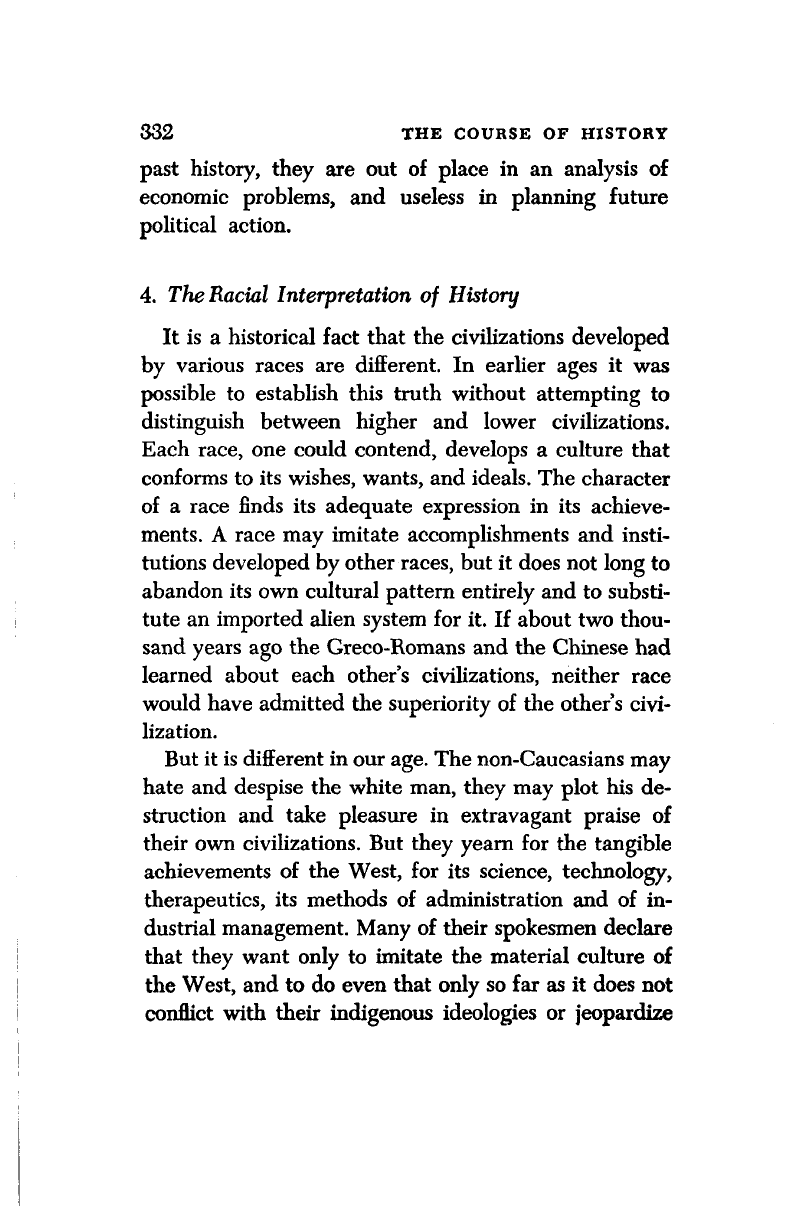
332 THE COURSE OF HISTORY
past history, they are out of place in an analysis of
economic problems, and useless in planning future
political action.
4.
The Racial Interpretation of History
It is a historical fact that the civilizations developed
by various races are different. In earlier ages it was
possible to establish this truth without attempting to
distinguish between higher and lower civilizations.
Each race, one could contend, develops a culture that
conforms to its wishes, wants, and ideals. The character
of a race finds its adequate expression in its achieve-
ments. A race may imitate accomplishments and insti-
tutions developed by other races, but it does not long to
abandon its own cultural pattern entirely and to substi-
tute an imported alien system for it. If about two thou-
sand years ago the Greco-Romans and the Chinese had
learned about each other's civilizations, neither race
would have admitted the superiority of the other's civi-
lization.
But it is different in our age. The non-Caucasians may
hate and despise the white man, they may plot his de-
struction and take pleasure in extravagant praise of
their own civilizations. But they yearn for the tangible
achievements of the West, for its science, technology,
therapeutics, its methods of administration and of in-
dustrial management. Many of their spokesmen declare
that they want only to imitate the material culture of
the West, and to do even that only so far as it does not
conflict with their indigenous ideologies or jeopardize
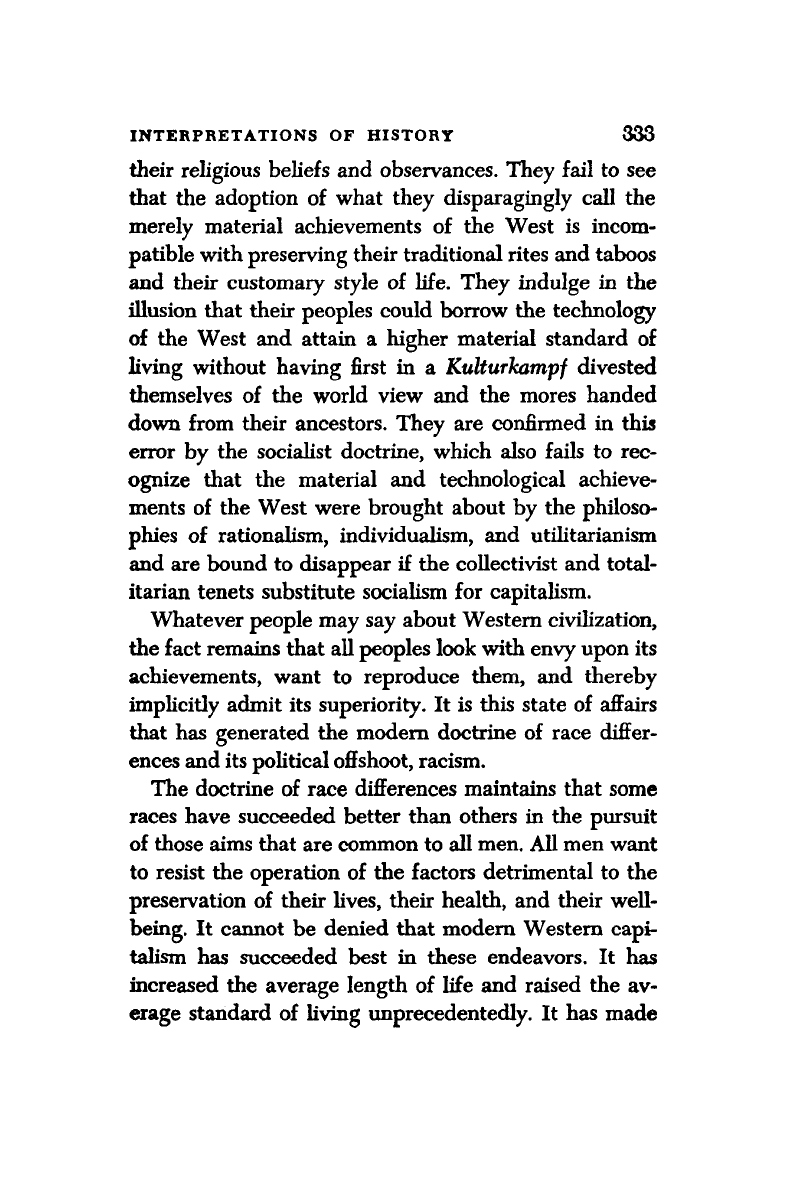
INTERPRETATIONS OF HISTORY 333
their religious beliefs and observances. They fail to see
that the adoption of what they disparagingly call the
merely material achievements of the West is incom-
patible with preserving their traditional rites and taboos
and their customary style of life. They indulge in the
illusion that their peoples could borrow the technology
of the West and attain a higher material standard of
living without having first in a Kulturkampf divested
themselves of the world view and the mores handed
down from their ancestors. They are confirmed in this
error by the socialist doctrine, which also fails to rec-
ognize that the material and technological achieve-
ments of the West were brought about by the philoso-
phies of rationalism, individualism, and utilitarianism
and are bound to disappear if the collectivist and total-
itarian tenets substitute socialism for capitalism.
Whatever people may say about Western civilization,
the fact remains that all peoples look with envy upon its
achievements, want to reproduce them, and thereby
implicitly admit its superiority. It is this state of affairs
that has generated the modern doctrine of race differ-
ences and its political offshoot, racism.
The doctrine of race differences maintains that some
races have succeeded better than others in the pursuit
of those aims that are common to all men. All men want
to resist the operation of the factors detrimental to the
preservation of their lives, their health, and their well-
being. It cannot be denied that modern Western capi-
talism has succeeded best in these endeavors. It has
increased the average length of life and raised the av-
erage standard of living unprecedentedly. It has made
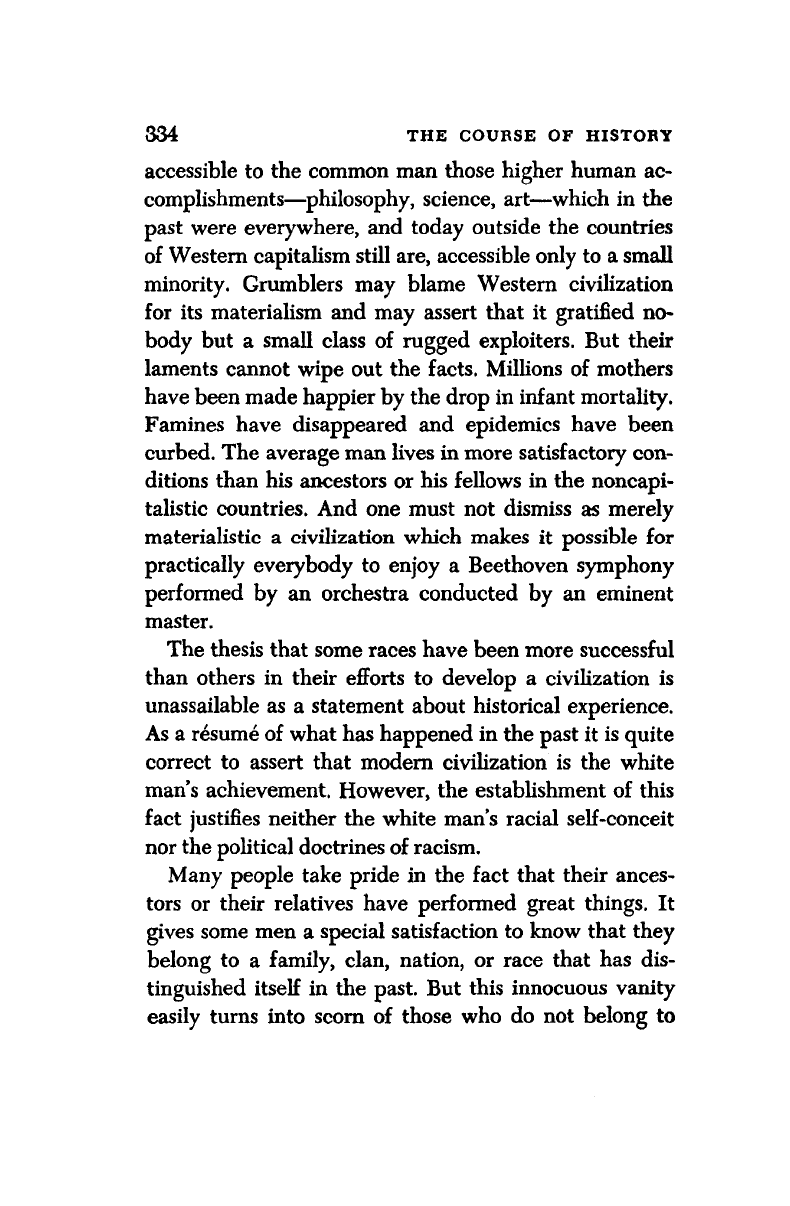
334 THE COURSE OF HISTORY
accessible to the common man those higher human ac-
complishments—philosophy, science, art—which in the
past were everywhere, and today outside the countries
of Western capitalism still are, accessible only to a small
minority. Grumblers may blame Western civilization
for its materialism and may assert that it gratified no-
body but a small class of rugged exploiters. But their
laments cannot wipe out the facts. Millions of mothers
have been made happier by the drop in infant mortality.
Famines have disappeared and epidemics have been
curbed. The average man lives in more satisfactory con-
ditions than his ancestors or his fellows in the noncapi-
talistic countries. And one must not dismiss as merely
materialistic a civilization which makes it possible for
practically everybody to enjoy a Beethoven symphony
performed by an orchestra conducted by an eminent
master.
The thesis that some races have been more successful
than others in their efforts to develop a civilization is
unassailable as a statement about historical experience.
As a resume of what has happened in the past it is quite
correct to assert that modern civilization is the white
man's achievement. However, the establishment of this
fact justifies neither the white man's racial self-conceit
nor the political doctrines of racism.
Many people take pride in the fact that their ances-
tors or their relatives have performed great things. It
gives some men a special satisfaction to know that they
belong to a family, clan, nation, or race that has dis-
tinguished itself in the past. But this innocuous vanity
easily turns into scorn of those who do not belong to
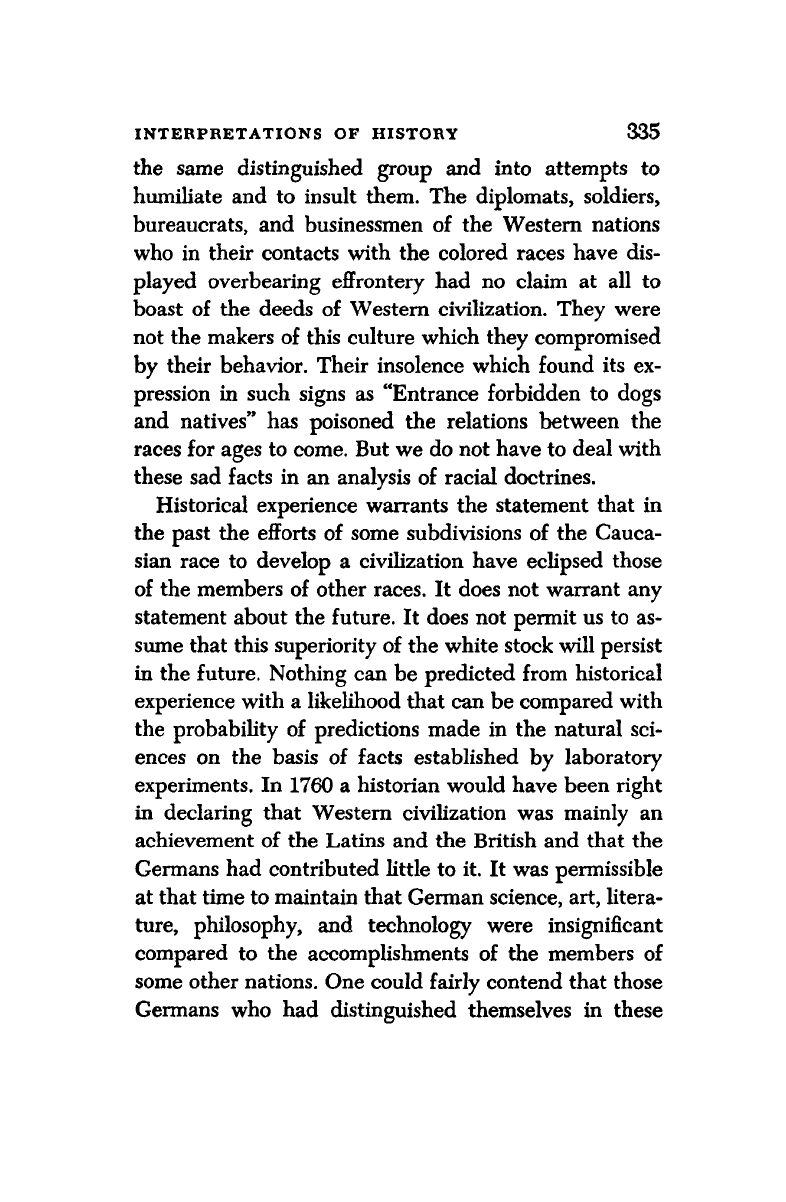
INTERPRETATIONS OF HISTORY 335
the same distinguished group and into attempts to
humiliate and to insult them. The diplomats, soldiers,
bureaucrats, and businessmen of the Western nations
who in their contacts with the colored races have dis-
played overbearing effrontery had no claim at all to
boast of the deeds of Western civilization. They were
not the makers of this culture which they compromised
by their behavior. Their insolence which found its ex-
pression in such signs as "Entrance forbidden to dogs
and natives" has poisoned the relations between the
races for ages to come. But we do not have to deal with
these sad facts in an analysis of racial doctrines.
Historical experience warrants the statement that in
the past the efforts of some subdivisions of the Cauca-
sian race to develop a civilization have eclipsed those
of the members of other races. It does not warrant any
statement about the future. It does not permit us to as-
sume that this superiority of the white stock will persist
in the future. Nothing can be predicted from historical
experience with a likelihood that can be compared with
the probability of predictions made in the natural sci-
ences on the basis of facts established by laboratory
experiments. In 1760 a historian would have been right
in declaring that Western civilization was mainly an
achievement of the Latins and the British and that the
Germans had contributed little to it. It was permissible
at that time to maintain that German science, art, litera-
ture, philosophy, and technology were insignificant
compared to the accomplishments of the members of
some other nations. One could fairly contend that those
Germans who had distinguished themselves in these
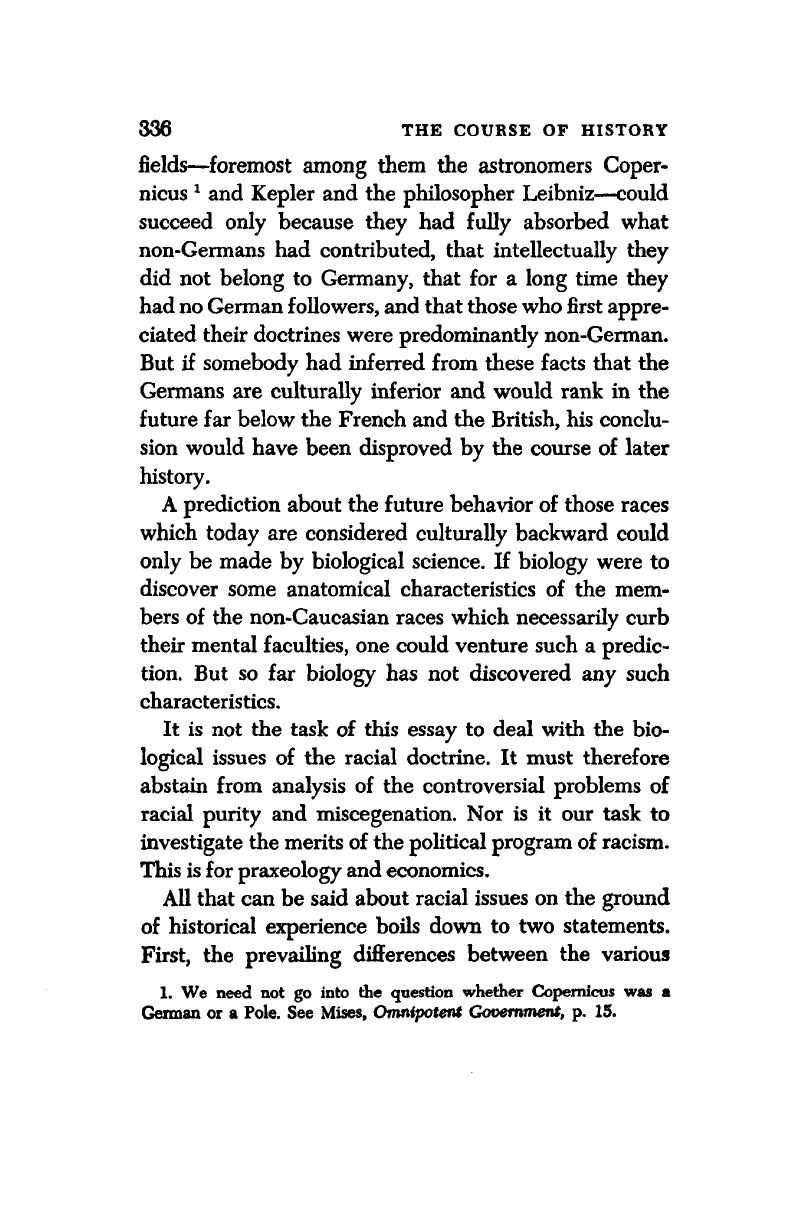
336 THE COURSE OF HISTORY
fields—foremost among them the astronomers Coper-
nicus
*
and Kepler and the philosopher Leibniz—could
succeed only because they had fully absorbed what
non-Germans had contributed, that intellectually they
did not belong to Germany, that for a long time they
had no German followers, and that those who first appre-
ciated their doctrines were predominantly non-German.
But if somebody had inferred from these facts that the
Germans are culturally inferior and would rank in the
future far below the French and the British, his conclu-
sion would have been disproved by the course of later
history.
A prediction about the future behavior of those races
which today are considered culturally backward could
only be made by biological science. If biology were to
discover some anatomical characteristics of the mem-
bers of the non-Caucasian races which necessarily curb
their mental faculties, one could venture such a predic-
tion.
But so far biology has not discovered any such
characteristics.
It is not the task of this essay to deal with the bio-
logical issues of the racial doctrine. It must therefore
abstain from analysis of the controversial problems of
racial purity and miscegenation. Nor is it our task to
investigate the merits of the political program of racism.
This is for praxeology and economics.
All that can be said about racial issues on the ground
of historical experience boils down to two statements.
First, the prevailing differences between the various
1.
We need not go into the question whether Copernicus was a
German or a Pole. See Mises, Omnipotent Government, p. 15.
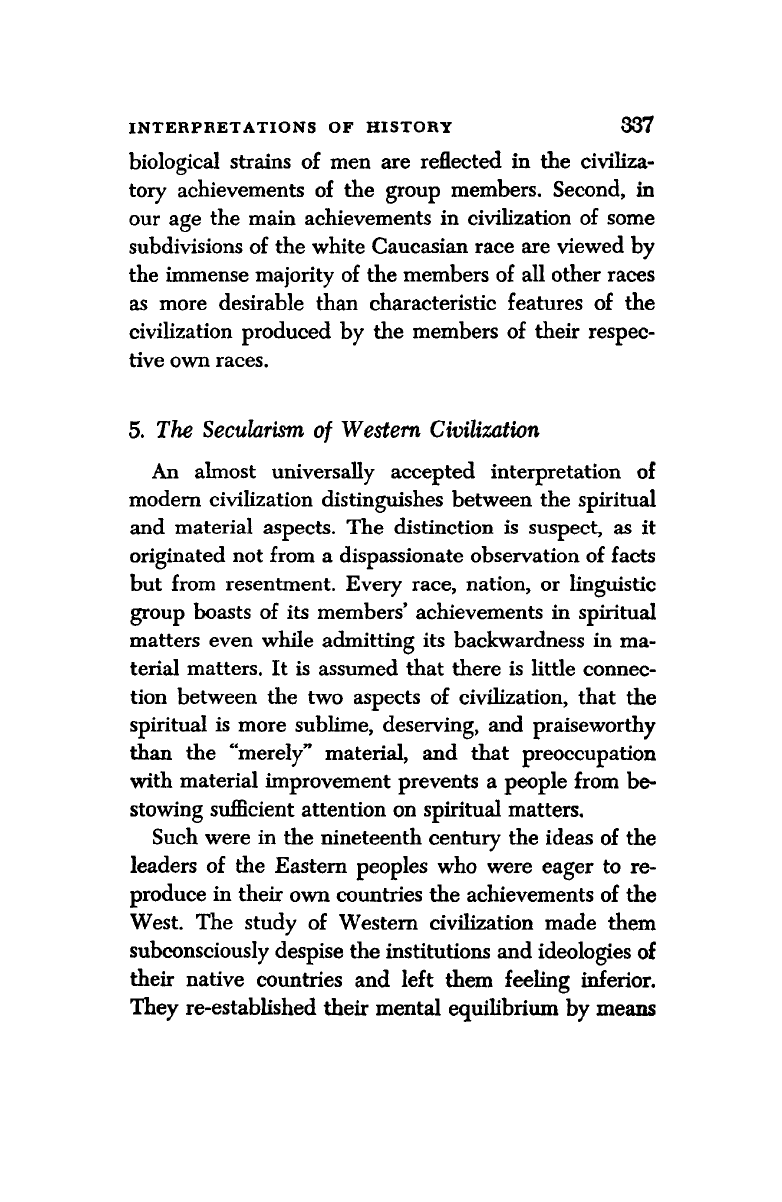
INTERPRETATIONS OF HISTORY 337
biological strains of men are reflected in the civiliza-
tory achievements of the group members. Second, in
our age the main achievements in civilization of some
subdivisions of the white Caucasian race are viewed by
the immense majority of the members of all other races
as more desirable than characteristic features of the
civilization produced by the members of their respec-
tive own races.
5. The
Secularism
of Western Civilization
An almost universally accepted interpretation of
modern civilization distinguishes between the spiritual
and material aspects. The distinction is suspect, as it
originated not from a dispassionate observation of facts
but from resentment. Every race, nation, or linguistic
group boasts of its members' achievements in spiritual
matters even while admitting its backwardness in ma-
terial matters. It is assumed that there is little connec-
tion between the two aspects of civilization, that the
spiritual is more sublime, deserving, and praiseworthy
than the "merely" material, and that preoccupation
with material improvement prevents a people from be-
stowing sufficient attention on spiritual matters.
Such were in the nineteenth century the ideas of the
leaders of the Eastern peoples who were eager to re-
produce in their own countries the achievements of the
West. The study of Western civilization made them
subconsciously despise the institutions and ideologies of
their native countries and left them feeling inferior.
They re-established their mental equilibrium by means
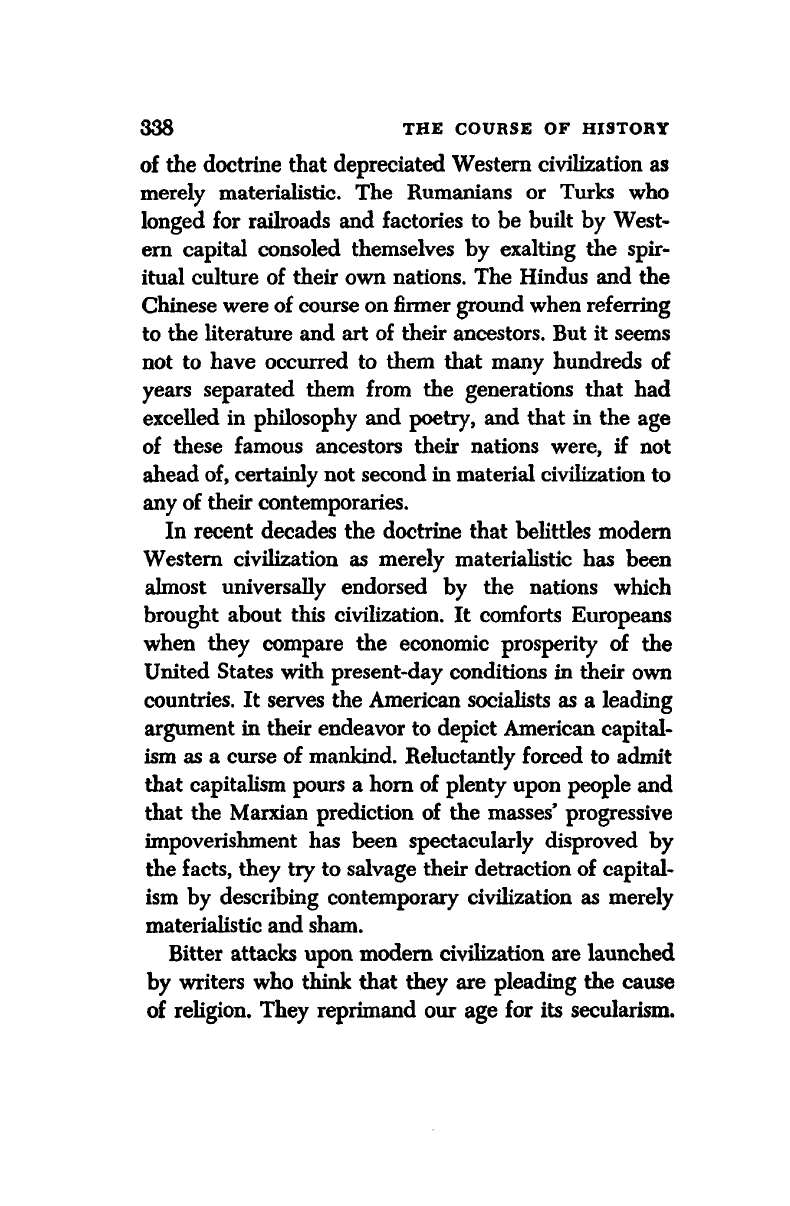
338 THE COURSE OF HISTORY
of the doctrine that depreciated Western civilization as
merely materialistic. The Rumanians or Turks who
longed for railroads and factories to be built by West-
ern capital consoled themselves by exalting the spir-
itual culture of their own nations. The Hindus and the
Chinese were of course on firmer ground when referring
to the literature and art of their ancestors. But it seems
not to have occurred to them that many hundreds of
years separated them from the generations that had
excelled in philosophy and poetry, and that in the age
of these famous ancestors their nations were, if not
ahead of, certainly not second in material civilization to
any of their contemporaries.
In recent decades the doctrine that belittles modern
Western civilization as merely materialistic has been
almost universally endorsed by the nations which
brought about this civilization. It comforts Europeans
when they compare the economic prosperity of the
United States with present-day conditions in their own
countries. It serves the American socialists as a leading
argument in their endeavor to depict American capital-
ism as a curse of mankind. Reluctantly forced to admit
that capitalism pours a horn of plenty upon people and
that the Marxian prediction of the masses' progressive
impoverishment has been spectacularly disproved by
the facts, they try to salvage their detraction of capital-
ism by describing contemporary civilization as merely
materialistic and sham.
Bitter attacks upon modern civilization are launched
by writers who think that they are pleading the cause
of religion. They reprimand our age for its secularism.
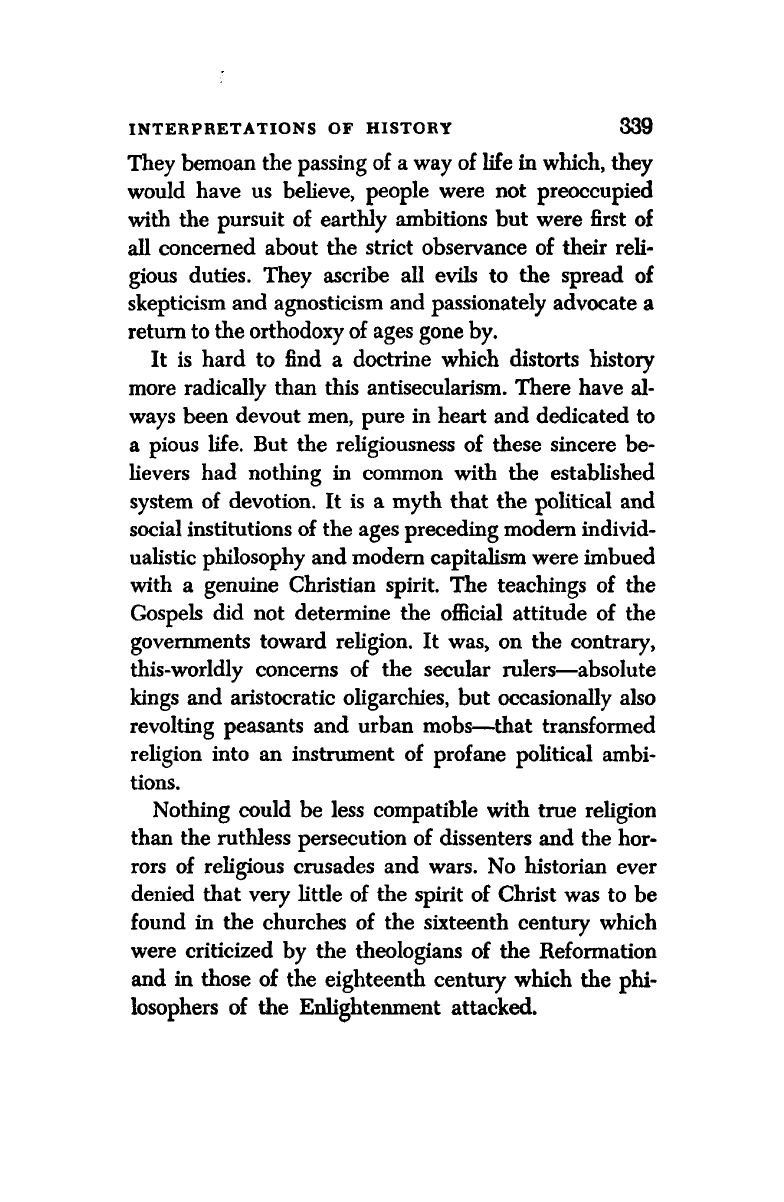
INTERPRETATIONS OF HISTORY 339
They bemoan the passing of a way of life in which, they
would have us believe, people were not preoccupied
with the pursuit of earthly ambitions but were first of
all concerned about the strict observance of their reli-
gious duties. They ascribe all evils to the spread of
skepticism and agnosticism and passionately advocate a
return to the orthodoxy of ages gone by.
It is hard to find a doctrine which distorts history
more radically than this antisecularism. There have al-
ways been devout men, pure in heart and dedicated to
a pious Me. But the religiousness of these sincere be-
lievers had nothing in common with the established
system of devotion. It is a myth that the political and
social institutions of the ages preceding modern individ-
ualistic philosophy and modern capitalism were imbued
with a genuine Christian spirit. The teachings of the
Gospels did not determine the official attitude of the
governments toward religion. It was, on the contrary,
this-worldly concerns of the secular rulers—absolute
kings and aristocratic oligarchies, but occasionally also
revolting peasants and urban mobs—that transformed
religion into an instrument of profane political ambi-
tions.
Nothing could be less compatible with true religion
than the ruthless persecution of dissenters and the hor-
rors of religious crusades and wars. No historian ever
denied that very little of the spirit of Christ was to be
found in the churches of the sixteenth century which
were criticized by the theologians of the Reformation
and in those of the eighteenth century which the phi-
losophers of the Enlightenment attacked.
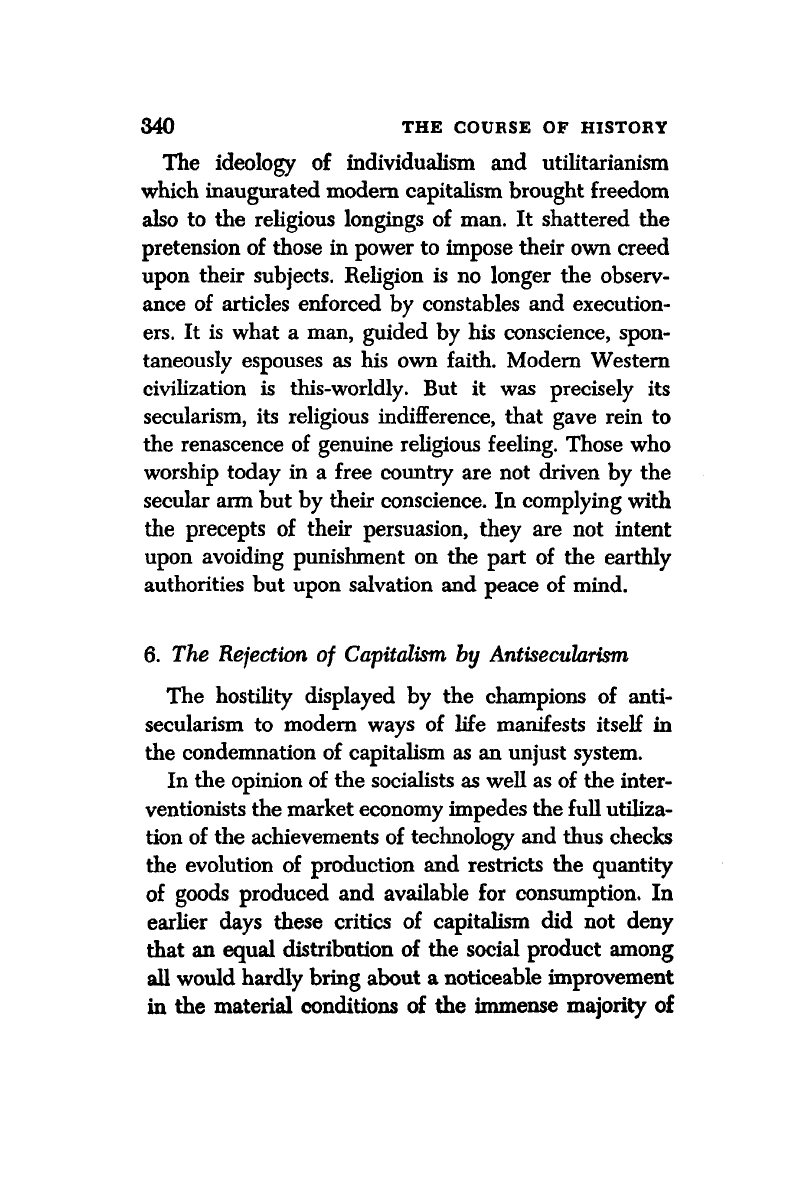
340 THE COURSE OF HISTORY
The ideology of individualism and utilitarianism
which inaugurated modern capitalism brought freedom
also to the religious longings of man. It shattered the
pretension of those in power to impose their own creed
upon their subjects. Religion is no longer the observ-
ance of articles enforced by constables and execution-
ers.
It is what a man, guided by his conscience, spon-
taneously espouses as his own faith. Modern Western
civilization is this-worldly. But it was precisely its
secularism, its religious indifference, that gave rein to
the renascence of genuine religious feeling. Those who
worship today in a free country are not driven by the
secular arm but by their conscience. In complying with
the precepts of their persuasion, they are not intent
upon avoiding punishment on the part of the earthly
authorities but upon salvation and peace of mind.
6. The Rejection of Capitalism by Antisecularism
The hostility displayed by the champions of anti-
secularism to modern ways of life manifests itself in
the condemnation of capitalism as an unjust system.
In the opinion of the socialists as well as of the inter-
ventionists the market economy impedes the full utiliza-
tion of the achievements of technology and thus checks
the evolution of production and restricts the quantity
of goods produced and available for consumption. In
earlier days these critics of capitalism did not deny
that an equal distribution of the social product among
all would hardly bring about a noticeable improvement
in the material conditions of the immense majority of
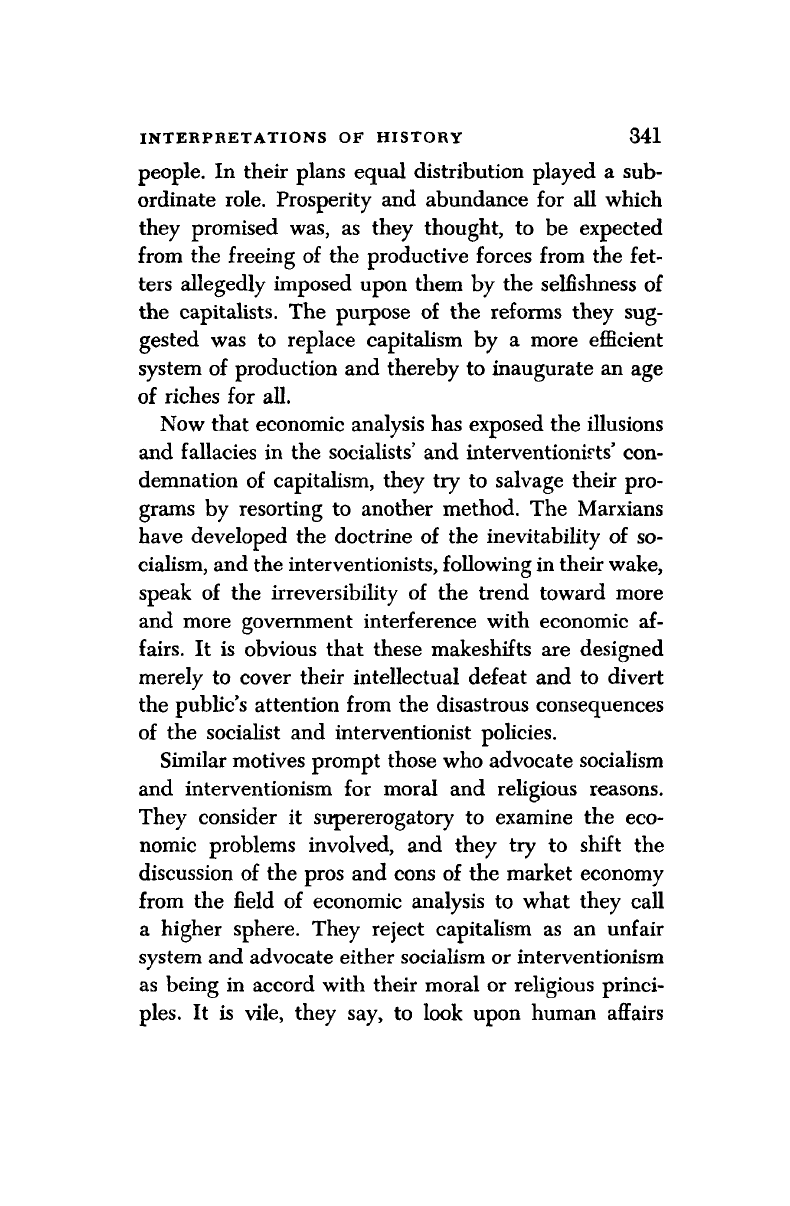
INTERPRETATIONS OF HISTORY 341
people. In their plans equal distribution played a sub-
ordinate role. Prosperity and abundance for all which
they promised was, as they thought, to be expected
from the freeing of the productive forces from the fet-
ters allegedly imposed upon them by the selfishness of
the capitalists. The purpose of the reforms they sug-
gested was to replace capitalism by a more efficient
system of production and thereby to inaugurate an age
of riches for all.
Now that economic analysis has exposed the illusions
and fallacies in the socialists' and interventionists' con-
demnation of capitalism, they try to salvage their pro-
grams by resorting to another method. The Marxians
have developed the doctrine of the inevitability of so-
cialism, and the interventionists, following in their wake,
speak of the irreversibility of the trend toward more
and more government interference with economic af-
fairs.
It is obvious that these makeshifts are designed
merely to cover their intellectual defeat and to divert
the public's attention from the disastrous consequences
of the socialist and interventionist policies.
Similar motives prompt those who advocate socialism
and interventionism for moral and religious reasons.
They consider it supererogatory to examine the eco-
nomic problems involved, and they try to shift the
discussion of the pros and cons of the market economy
from the field of economic analysis to what they call
a higher sphere. They reject capitalism as an unfair
system and advocate either socialism or interventionism
as being in accord with their moral or religious princi-
ples.
It is vile, they say, to look upon human affairs
